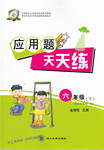题目内容
12.Jack,stopsighing (叹息) over the failure of the test.Try to do better next time.分析 Jack,不要再为考试的失利唉声叹气了,下次尽力做好就可以了.
解答 答案:sighing
解析:根据括号内的中文提示可知,本题考查sigh"叹息;叹气"一词;又根据句意"不要为…叹息了"可知,本题还考查stop doing sth"停止做某事"这一固定短语.综上,本题答案为:sighing.拓展:stop to do sth 意为"停下去做另一件事情",而stop doing sth 意为"停止做某事(停下手头正在做的事情)".
点评 本题考查句子翻译,做此类题目时一定要根据中文及英文题干确定需要翻译的成分,再找出与之对应的英文并考虑各成分是否有形式的改变.

练习册系列答案
 应用题天天练四川大学出版社系列答案
应用题天天练四川大学出版社系列答案
相关题目
2.A man wanted to become wealthy.He was told a story one day that there was a (31)C pebble (鹅卵石)among the pebbles on the beach of the Black Sea.It could turn everything it touched into(32)A.This pebble could be (33)Donly by touching it:unlike the other pebbles it was (34)Awhen touched.The man rushed to the beach of the Black Sea and began to (35)Bthe pebble.
(36)C he picked up a pebble that felt cold,he threw it into the sea.He (37)C this practice day after day.Each pebble that felt cold was (38)D thrown into the sea.
One morning,he(39)B to take hold of a pebble that felt warm,unlike the other (40)C.The man threw the pebble into the sea.He hadn't(41)C to,but he had formed a habit.Habits can be hard to (42)B.
In fact,if we repeat any behaviour (43)A enough,it becomes a habit.But some habits can work in our favour,such as (44)C attitudes and healthy ways of life.Our habitual attitudes and behaviour can either (45)B us or hinder(阻碍) us.
Is there behaviour or an attitude you would like to make into a(46)D?Then reinforce (强化) it by (47)A it at every opportunity.
When it comes to habits,(48)Dmay not make perfect.But practice will certainly form (49)C behaviour.Your habits will form who you are.So form the habits that are (50)B to you and let them mold (塑造) you into the person you want to be.
(36)C he picked up a pebble that felt cold,he threw it into the sea.He (37)C this practice day after day.Each pebble that felt cold was (38)D thrown into the sea.
One morning,he(39)B to take hold of a pebble that felt warm,unlike the other (40)C.The man threw the pebble into the sea.He hadn't(41)C to,but he had formed a habit.Habits can be hard to (42)B.
In fact,if we repeat any behaviour (43)A enough,it becomes a habit.But some habits can work in our favour,such as (44)C attitudes and healthy ways of life.Our habitual attitudes and behaviour can either (45)B us or hinder(阻碍) us.
Is there behaviour or an attitude you would like to make into a(46)D?Then reinforce (强化) it by (47)A it at every opportunity.
When it comes to habits,(48)Dmay not make perfect.But practice will certainly form (49)C behaviour.Your habits will form who you are.So form the habits that are (50)B to you and let them mold (塑造) you into the person you want to be.
| 31.A.carved | B.large | C.magical | D.heavy |
| 32.A.gold | B.water | C.sand | D.stone |
| 33.A.created | B.saved | C.changed | D.recognized |
| 34.A.warm | B.shining | C.smooth | D.hard |
| 35.A.look into | B.search for | C.make | D.study |
| 36.A.Unless | B.Although | C.When | D.Until |
| 37.A.tested | B.developed | C.continued | D.analysed |
| 38.A.luckily | B.carelessly | C.suddenly | D.immediately |
| 39.A.attempted | B.happened | C.decided | D.began |
| 40.A.hands | B.trees | C.pebbles | D.balls |
| 41.A.asked | B.remembered | C.meant | D.offered |
| 42.A.ignore | B.break | C.learn | D.forget |
| 43.A.often | B.carefully | C.fast | D.calmly |
| 44.A.related | B.public | C.positive | D.conservative |
| 45.A.trouble | B.help | C.expose | D.defeat |
| 46.A.custom | B.plan | C.rule | D.habit |
| 47.A.repeating | B.retelling | C.changing | D.considering |
| 48.A.attitude | B.attempt | C.guidance | D.practice |
| 49.A.violent | B.bored | C.permanent | D.strange |
| 50.A.devoted | B.beneficial | C.familiar | D.true |